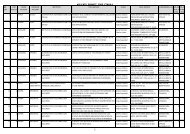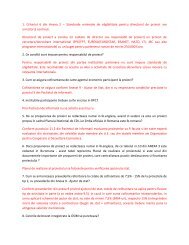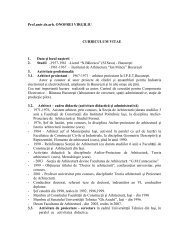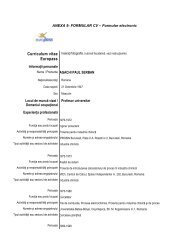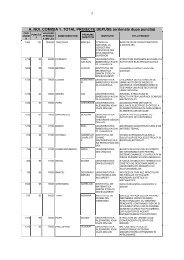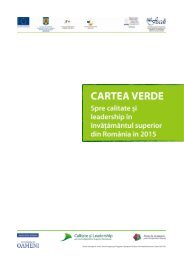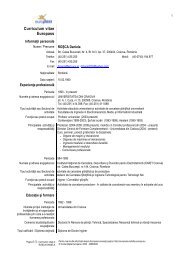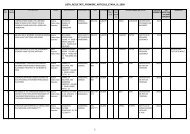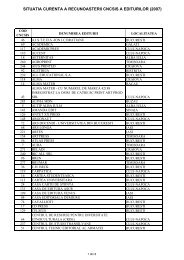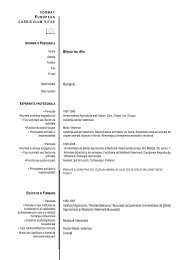Modul de formare-Managementul resurselor financiare - uefiscdi
Modul de formare-Managementul resurselor financiare - uefiscdi
Modul de formare-Managementul resurselor financiare - uefiscdi
- No tags were found...
Create successful ePaper yourself
Turn your PDF publications into a flip-book with our unique Google optimized e-Paper software.
liabilities, regardless of its economic content, market predictable evolution, consequences<br />
are evaluated this way.<br />
The principle of the inviolability -The opening balance of the financial year must<br />
correspond with the closing balance of previous year, except for corrections required by the<br />
application of international accounting standards.<br />
The no offset principle – The values of elements inclu<strong>de</strong>d as assets can not be offset by the<br />
amounts of elements inclu<strong>de</strong>d as liabillities, except the compensations allowed by<br />
International Accounting Standards (amen<strong>de</strong>d accounts).<br />
The prevalence of the economic over the legal - The information presented in the financial<br />
statements should reflect the economic reality of events and transactions, not just their legal<br />
form.<br />
The materiality principle - Any item that has a significant value should be presented<br />
separately in the financial statements.<br />
The Accrual Principle – The transactions and events are recor<strong>de</strong>d in accounting when they<br />
occur and not when the amounts are paid or received.<br />
5.2. The financial-accounting information. Necessity and utility<br />
Un<strong>de</strong>r the current provisions enforced, the public or private universities are legal persons of<br />
public interest, with a non-profit nature, are non-political and promote education and research as<br />
public goods. Public universities being public institutions with partial funding from the state<br />
budget, lead and organize accounting after the special rules of public institutions’ accounting.<br />
To un<strong>de</strong>rstand the place and role of financial accounting information at higher education<br />
institutions levels, we first af all clarify the basic concepts used in public institutions’<br />
accounting: allocation; budget allocations; budget year; budgetary commitment; legal<br />
commitment; budget article; good financial management; revenue and expenditure budget; the<br />
multiannual budgetary expenditures; budgetary classifiers; economic classifiers; functional<br />
classifiers; co-financing; budget appropriations; loans for multiannual actions; commitment<br />
loan; budget <strong>de</strong>ficit; opening of budget appropriations; donation; budget balance; budget<br />
surplus; budget execution; public finance; budget reserve fund; revolving fund; special funds;<br />
means of balancing the budget; the annual budget law; the budget rectification law; expenses<br />
realisation; authorizing officer; expenditures authorizing; expenditure payments ; cash<br />
payments; net cash payments; budgetary process; amounts broken down; transfers; treasury;<br />
state treasury; payment; budget revenues; transfer of budget appropriations.<br />
Clarifying each basic concept used in the university accounting, will enable the layman to<br />
un<strong>de</strong>rstand:<br />
how to draw up consolidated financial statements;<br />
the patrimony elements and their way of coverage in summary records;<br />
the particularities of each category of assets;<br />
aspects regarding <strong>de</strong>preciation;<br />
invetories assessment;<br />
the relationships with suppliers and customers;<br />
the institution relationships with employees;<br />
the payment and collection means available to entity;<br />
institution specific documents;<br />
essentials about equity funds, <strong>de</strong>bt;<br />
institution specific typology of revenues and expenditures ;<br />
the procedures for public aquisitions;<br />
46



